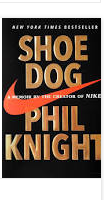“Shoe Dog,” Phil Knight’s memoir of his life up until approximately the time Nike became a public company, has turned up on a number of ‘best books of 2016’ lists for a good reason: it’s lively, suspenseful, and the voice Knight presents is both humble and engaging. Knight didn’t set out to form a behemoth public company but back in 1962 he did have a good idea, one he refers to as his Crazy Idea: Japanese running shoes could dominate the market the way Japanese cameras had displaced German ones. He wanted to make that happen.
Knight grew up in Oregon and attended the University of Oregon – where he was a member of the track team, coached by the legendary Bill Bowerman. Knight describes Bowerman as “a genius coach, a master motivator, a natural leader of young men” and a tinkerer – someone who was always working to make his team members’ shoes better and lighter. Knight says:
There were four or five of us on the track team who were Bowerman’s podiatry guinea pigs, but I was his pet project. Something about my feet spoke to him. Something about my stride. Also, I afforded a wide margin of error. I wasn’t the best on the team, not by a long shot, so he could afford to make mistakes on me. With my more talented teammates he didn’t dare take undue chances.
The Crazy Idea grew out of a presentation Knight made in his final year of Stanford Business School, in an entrepreneurship class. He followed it, in 1962, with a trip around the world – after a long layover in Hawaii with a friend, he went on alone to Japan where he pitched his idea to a Japanese shoe company, which, after some persuasion, gave Knight a trial as American distributor of its shoes. To make money, Knight took an accounting job; to add to his credentials, he studied for a CPA. He does not elide over the hard work and long hours – Knight had a full-time job, and when work finished, he’d spend evenings and weekends selling shoes.
The book is organized chronologically, a chapter for each year, and Knight tells his story with great humor. By 1968 he was married, and his first child was on the way. The business was growing, and required a great deal of time away on the road. Relations with Knight’s Japanese bankers were challenging; his bankers were demanding, and a growing family and growing business both require real estate. The switch from distributing shoes to manufacturing them did not come in one blinding flash of illumination (neither did the design of the now-iconic swoosh) but rather each was the result of a series of small decisions. Knight is also good about sharing credit – with Bowerman for shoe designs, with his early employees and investors. Most important, Knight credits his first employee with coming up with Nike as the name of the company (Knight was pushing for “Dimension Six”).
Nonetheless, the description of the thinking behind the switch from importing and distributing to manufacturing – is minimal, as are many later business decisions, including the details of how Nike went about developing athlete endorsement relationships and team uniform purchases. There’s no discussion of Nike’s sweatshop or child labor controversies. That’s consistent with Knight’s approach to his memoir, which virtually ends in 1980 with the decision to take Nike public. Knight describes himself as fundamentally shy and very private person, an unexpected yet persuasive self-description of someone who has a very public role. Knight writes broadly but not deeply about his family life, describing family tensions – his parents’ difficult marriage, the cost to his family of all his time on the road, and the death of his oldest son Matthew in a diving accident – but leaving the reader to draw her own conclusions about his feelings.
Knight’s advice to himself as a twenty-five year old is still good advice. “Don’t stop,” he writes. “Don’t even think about stopping until you get there, and don’t give much thought to where ‘there’ is. Whatever comes, just don’t stop.”
Have a book you want me to know about? Email me at asbowie@gmail.com. Follow me on Twitter @abowie917.




